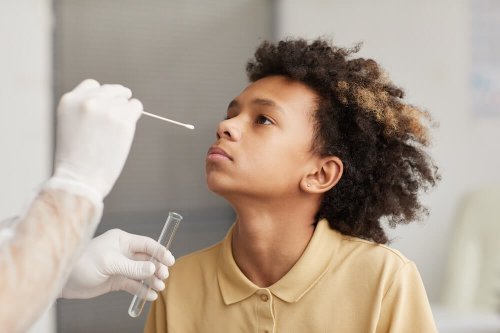As the government continues to ramp up the roll-out of vaccines, continued testing for COVID-19 is necessary to control its spread. As a result of the three previous surges, we’re learning more about the confusing array of coronavirus testing options at medical centers and doctors’ offices. Here’s what you should know.
What Are the Types of Coronavirus Tests?
According to the CDC, there are two basic types of coronavirus testing: tests for current infection or and tests that can determine past infections. A viral or diagnostic test will inform you if you are currently infected with the coronavirus. There are two types of viral tests that the doctor at the urgent care center may recommend, which are nucleic acid amplification tests or antigen tests. Antibody testing will show if you were previously infected with the virus causing COVID-19.
Here is a more in-depth look at the three types of coronavirus testing.
1. Antigen Test (A.K.A. Rapid COVID Testing)
This diagnostic testing is commonly known as a rapid test, as the turnaround time is much quicker than the PCR tests. You may receive your results in as little as 15 minutes. It is also cheaper to carry out, allowing the medical staff to screen a large number of people at a time.
- Specimen: nasopharyngeal swab
- Test will look for: antigens (protein) of the coronavirus
Antigen tests are quick as they search for a specific protein. It works in a similar way to an at-home pregnancy self-test kit. You can place a bodily sample, such as the throat/nasopharyngeal swap, on a specially treated strip, which then uses a marker to indicate whether the coronavirus is present or not. While antigen testing is quick, it is more likely to miss an active infection. If you get a negative result but you still have COVID-19 symptoms, your physician may direct you to do a molecular to rule out the false negative.
2. Molecular Tests (A.K.A. PCR or RNA Tests)
PCR coronavirus testing is the most widespread and most accurate test for determining whether one is infected. Every virus has a unique genetic code. PCR tests involve picking a bodily sample and amplifying the specimen looking for specific viral genetic material or Ribonucleic Acids (RNAs).
- Specimen: nasopharyngeal or oropharyngeal swab
- Test will look for: nucleic acids for coronavirus
The healthcare worker at your immediate clinic will take a swab or sputum sample from the back of your throat or nose. The sample is sent to a lab where trained lab technicians extract the genetic material. The genetic material is then amplified and a testing machine checks for the coronavirus RNA. It is arguably the most accurate test, with most governments requesting a digitally signed negative PCR test result before traveling.
3. Antibody Testing
Antibody coronavirus testing does not detect the virus itself. Instead, it checks whether an individual has antibodies in their immune system to fight off the virus.
- Specimen: blood sample (prick)
- Test will look for: antibodies
When battling an infection, your immune system reacts, producing antibodies to fight off the virus. They are specific to the type of antigen, so the goal of this test is to find antibodies that target the novel coronavirus that causes COVID-19. This type of coronavirus testing is not used for diagnosis but can tell how widely the virus has spread within a community.
Schedule a Test
Staying informed about your health may include understanding how the various coronavirus tests work. If you have any questions about them or wish to schedule a test for you and your family, reach out to ImmediateCare Arizona.


